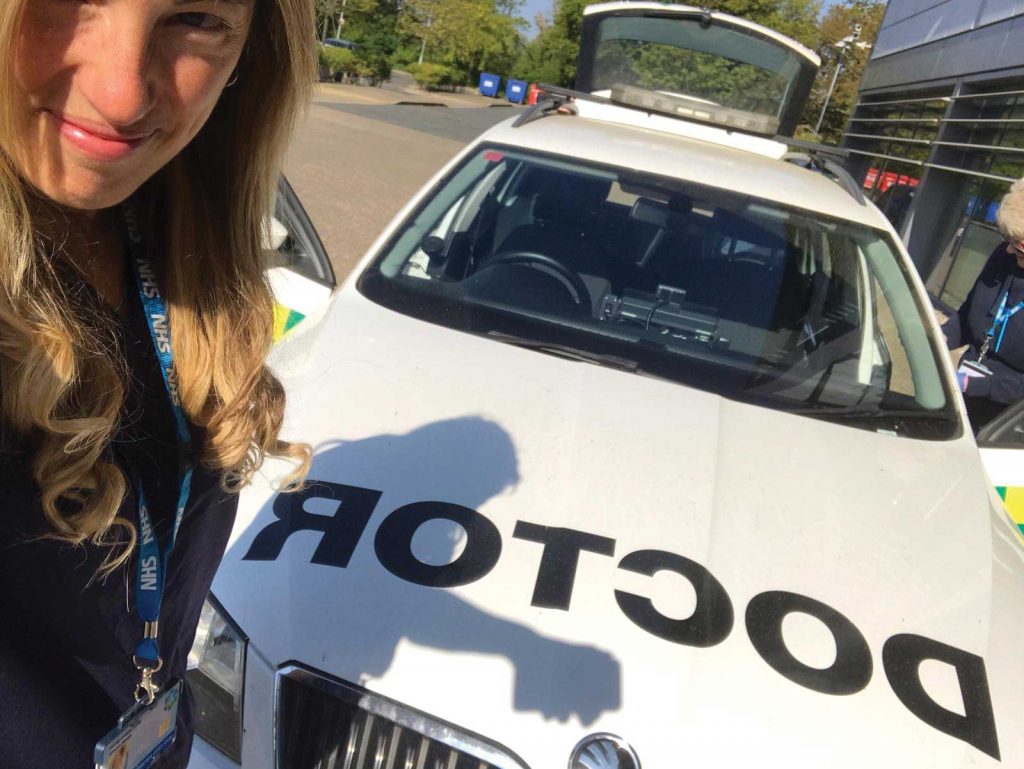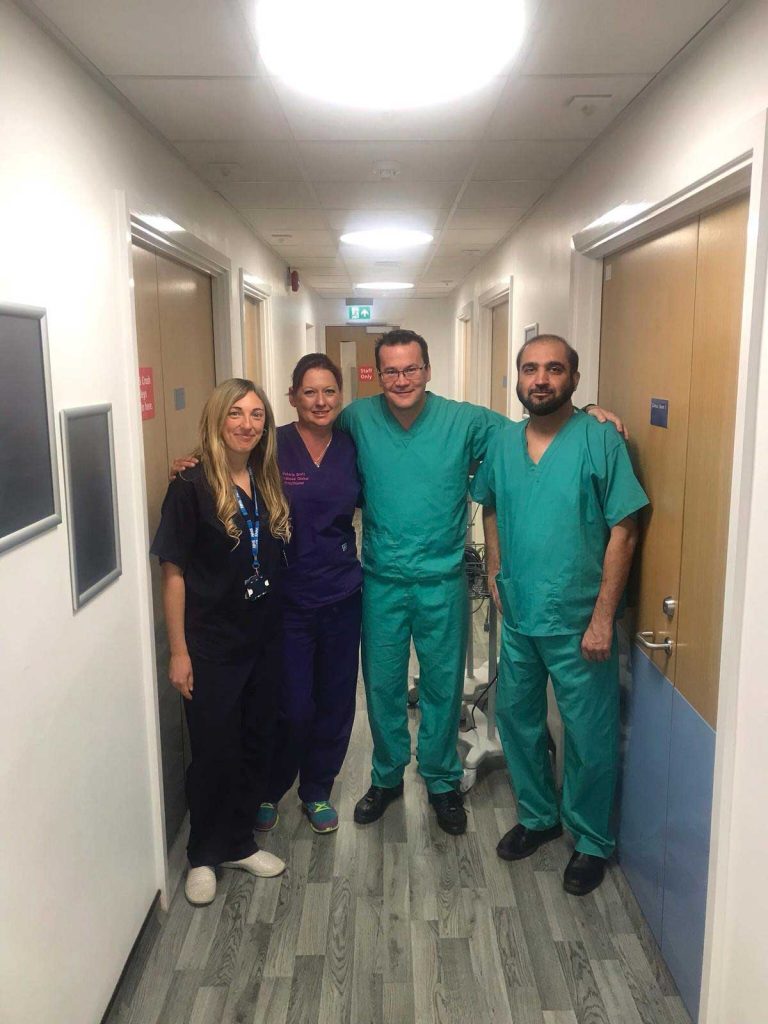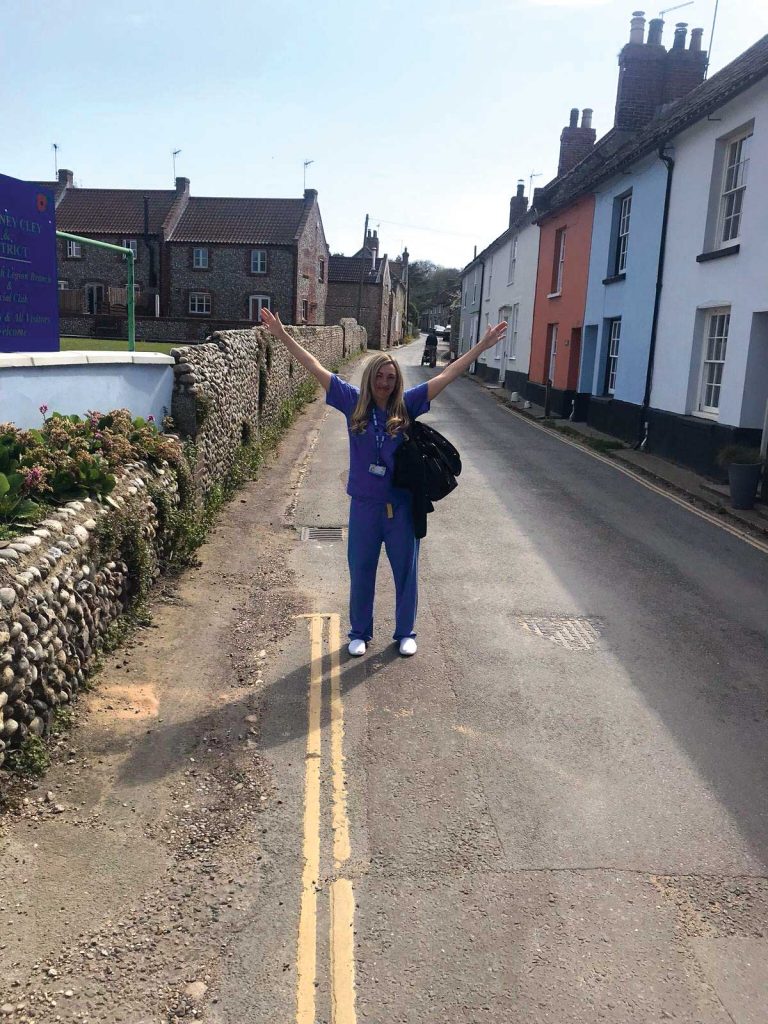Whilst the world was being ravaged by Covid-19, and we in Gibraltar prepared for a mass outbreak that did not arrive, one local GP decided that she wasn’t going to wait out the worst of the pandemic in the relative comfort of Gibraltar. So April Nilsen Nunn moved herself and her family of five back to the UK and worked solidly for
almost 2 months. Here she tells her remarkable story of being on the frontline of the pandemic.
Whilst the world was being ravaged by Covid-19, and we in Gibraltar prepared for a mass outbreak that did not arrive, one local GP decided that she wasn’t going to wait out the worst of the pandemic in the relative comfort of Gibraltar. So April Nilsen Nunn moved herself and her family of five back to the UK and worked solidly for
almost 2 months. Here she tells her remarkable story of being on the frontline of the pandemic.
“When the Covid-19 pandemic broke out, I signed up for helping the GHA, but never got the call as the health system here wasn’t overstretched. I work at the Specialist Medical Clinic in Gibraltar, but I’m also a UK registered doctor having trained and worked there for 11 years before coming to Gibraltar. The NHS trained me and made me the doctor I am today so I owe it a great deal. As I am General Medical Council registered, I do a certain amount of weeks a year practicing in the UK, to maintain my GMC status and keep up with current guidelines. In early March I went and worked for a week in Leeds, and was shocked by how little normal life had changed, given Spain had just gone into a strict lockdown, and it was worrying to see people still going to bars, shops and supermarkets as if there was no risk out there. I thought, if the UK is like this now and hasn’t shut down like the rest of the world has, it is going to be so baldly hit. I could see the strain starting to show on my colleagues, so I flew back and said to my husband ‘pack your bags, we are going back’; after all, the GHA didn’t need me and the children were off school and I am lucky that David Deardon, my boss fully supported me going back to support the NHS.
It started to kick off the week we got back to the UK. My friend found us an apartment in Leeds city centre, they were doing lots of rental deals. The UK went into lockdown on 23 March, but it felt like by then the damage had been done. I work in emergency care when I go back to the UK, on the 111 service in North Manchester, Yorkshire & Norfolk. The 111 is the out-of-hours GP service, non-emergency helpline. Depending on the location, Doctors in this service either see patients in the 111 treatment centres, home visits, or give telephone consultations.
After a few weeks in Leeds we moved to Norfolk. April was a brutal time, I struggled and broke down from what I saw there. Norfolk has a lot of elderly people and Covid doesn’t like elderly people. I covered the roving car doing house visits, as well as working in the treatment centre and a lot of our work moved on to the phones, as far fewer people came in person; people did listen to the government advice to stay home.”
Despite many news reports from the time, fortunately April did not experience a lack of PPE in her area and as an acute doctor she had to be well kitted out as was visiting multiple residences in a day. However April found going into care homes surreal, as she would go in wearing full PPE, but was shocked that staff in the homes were just dressed in their normal uniform without any PPE. This made April feel uncomfortable and concerned for the care home staffs’ welfare. If there had been a Coronavirus outbreak in a residence it would be certified as Covid – positive and April wouldn’t be allowed in, so would instead consult by phone and leave any required medicines on the doorstep, such as steroid medicines or inhalers.
“It was difficult as a doctor because your every instinct is to help and be able to treat patients. This is why it hit a lot of healthcare professionals so hard; you have all these machines to help patients breathe, but you cannot fight the virus for them. As a doctor, I was powerless against the virus; if you break your leg I will help you mend it, if you have an earache, I can help you, against this virus we had nothing, so that’s way we wanted people to not catch it in the first place.” She also mentions it’s worth remembering that 85% of people who caught it recovered well from it.
“A lot of our work was managing Covid anxiety at the beginning, and then as things developed, many people did have Coronavirus, we were supporting them at home. We got very good at telephone triage very quickly. If people needed an ambulance we could work out from their symptoms what was needed. We also had the usual emergency calls coming through, because children were still falling over, people were still having heart attacks so we were still attending to these patients, albeit it to a lesser degree.
In her typically self-effacing style though, April asserts that the real credit should go to the paramedics, as the ambulances were still going out no matter what and they took the brunt of the cases. “They were the heroes; and would often go out where GPs wouldn’t be allowed to, and have to enter Covid – positive homes. The ambulance crews have to respond to every call. Also the intensivists probably had a horrible pandemic; knowing that 70%if patents wouldn’t get out (which is the case for any intensive care not just Covid) they also had to wear those uncomfortable suits for long shifts.
April knew that the necessity for her to be in the UK was starting to come to an end when the calls started to be about anxiety and people saying they didn’t feel right, having had Covid, or were surprised at how long it was taking them to recover. As she says: “it is a very nasty respiratory virus and it can linger for a long time.”
Incredibly, April worked 51 out of the 56 days she was back in the UK, having told her husband that they would be there for 4 weeks. She is so grateful for her families’ support: “I couldn’t have done it without my family, I needed that normality and on the shifts I wasn’t working we were just in our little bubble; we would go for walks (we were staying in small villages in remote areas, near the sea). It was just like Covid didn’t exist, and then 24 hours later you were back in. It was pretty brutal, but at the time you just got on with it.”
Bizarrely when staying in a Norfolk village within a day off arriving April’s family had a note posted on their door saying ‘Go Home!’ – police later confirmed all NHS staff in the village had received one, from an elderly resident who was concerned about the influx of potentially lockdown rule flouters in the village; little did he know they were healthcare workers there to help, in an area that was short of doctors. Another of her colleagues even had their tyre slashed.
When she came back to Gibraltar, April had to take some time to herself, to decompress. “I had to let go of the badness. I saw enough death (in the elderly) to last me a lifetime and I hope I never have to see that again. There was a lot to process but I have dealt with it. Also with so many healthcare professionals having died, it’s very sad to lose colleagues.” The frequency of BAME healthcare workers dying was massively disproportionate and recent figures from the BMA state 95% doctors who died were BAME. When April was on the nightshift, she and her (caucasian) coworker, an advanced nurse practitioner would ensure they were the ones to first treat the patients coming in, so patients wouldn’t see the BAME staff if at all possible, as they assumed everyone had Covid until proven otherwise. “I wanted to protect my BAME colleagues, I worried about what would happen to them when we finished our shifts and every night I was terrified they’d catch it and I’d never see them again. For me, they are the brave ones and I’ll never forget their heroism during the pandemic. They were quite literally risking their life to go to work and serve the general public. I would like people to know how brave some doctors were and their bravery should never be forgotten. Personally I didn’t feel especially threatened because I am relatively young and don’t have any health predispositions to make me higher risks and I was always in PPE.” April wants to pay tribute to all of the healthcare professionals who have died in the pandemic, especially so many of BAME origins. She cites a shocking statistic she heard which is that more healthcare professionals have died in the Covid pandemic than British soldiers died in 8 years of the Iraqi war.
Asked if she sees herself as a hero, April shrugs, “there was no way I could have stayed home during this pandemic. I am a doctor, it’s in my training and my blood. The positives I take from this are it has given me a new perspective on life: we only have one life, go live it; remember to see and hug the people you love often. This experience has shown us all how precious life, family and friends are, don’t take a second for granted. Let’s all remember that going forward and just be kind.”












